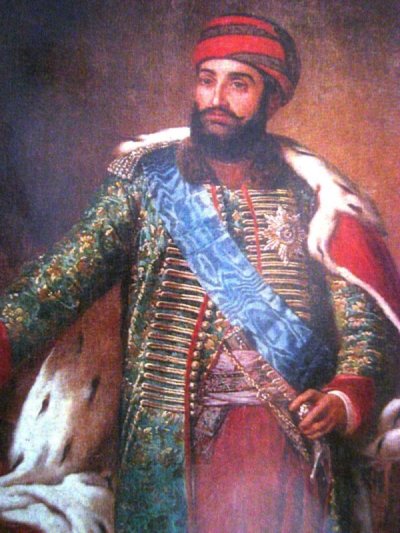|

King Erekle II of Kartli and Kakheti (7 November 1720 or 7 October 1721 – 11 January 1798)
|
|
In 1769-1772, a handful of Russian troops of General Totleben battled against Turkish invaders in the Georgian kingdoms of Imereti and Kartl-Kakheti.
In 1783 Russia and the eastern Georgian kingdom of Kartl-Kakheti (which was devastated by Turkish and Persian invasions ) signed the Treaty of Georgievsk, according to which Kartl-Kakheti was to protection by Russia.
On January 8, 1801 Tsar Paul I of Russia signed a decree on the incorporation of Georgia (Kartli-Kakheti) within the Russian Empire which was confirmed by Tsar Alexander I on September 12, 1801. The Georgian envoy in Sankt Petersburg Garsevan Chavchavadze reacted with a note of protest that was presented to the Russian vice-chancellor Alexander Kurakin. In May 1801 Russian General Carl Heinrich Knorring dethroned the Georgian heir to the throne David Batonishvili and deployed a government headed by General Ivan Petrovich Lasarev.
A part of the Georgian nobility didn't accept the decree until April 1802 when General Knorring compassed the nobility in Tbilisi's Sioni Cathedral and forced them to take an oath on the imperial crown of Russia. Those who disagreed were arrested temporarily.
The country was fully absorbed into the Russian Empire by 1804. In the summer 1805 Russian troops on the river Askerani and near Zagam defeated the Persian army, saving Tbilisi from its attack. In 1810, the kingdom of Imereti (Western Georgia) was annexed by the Russian Empire after the suppression of King Solomon II's resistance. From 1803 to 1878, as a result of numerous Russian wars against Turkey and Iran, several formerly Georgian territories were annexed to the Russian Empire. These areas (Batumi, Artvin, Akhaltsikhe, Poti, and Abkhazia) now represent the majority of the territory of the present state of Georgia.
Georgian dissatisfaction with Tsarist autocracy and Armenian economic domination led to the development of a national liberation movement in the second half of the 19th century. A large-scale peasant revolt occurred in 1905 which led to political reforms that eased the tensions for a period. During this time, the Marxist Social Democratic Party became the dominant political movement in Georgia, occupying all the Georgian seats in the Russian State Duma established after 1905. Josef Vissarionovich Djugashvili (also known as Joseph Stalin), a Georgian Bolshevik, became a leader of the revolutionary (and anti-Menshevik) movement in Georgia.
|